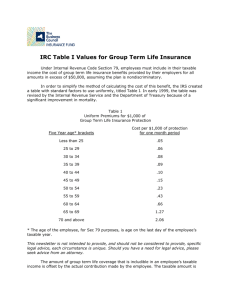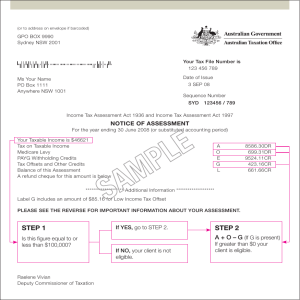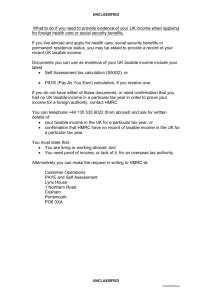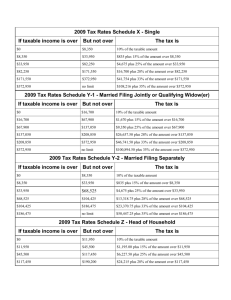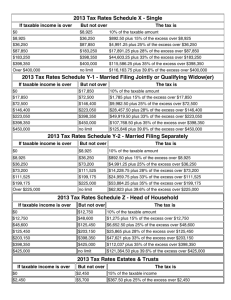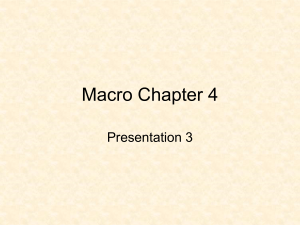Computer Software - Minnesota Department of Revenue
advertisement
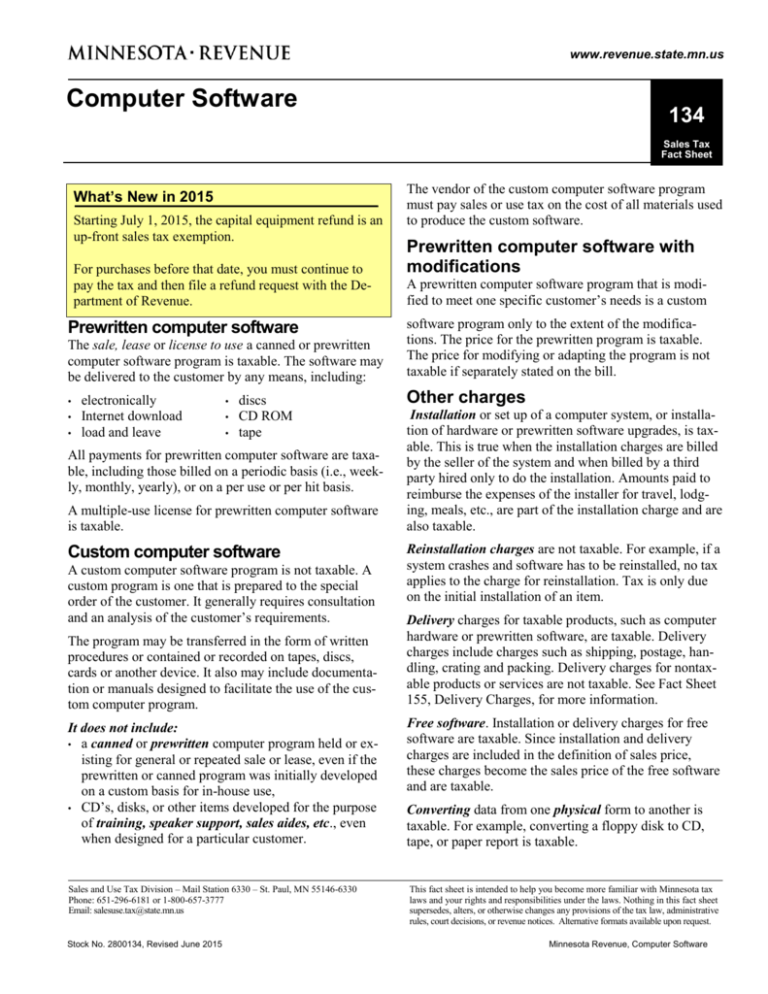
www.revenue.state.mn.us Computer Software 134 Sales Tax Fact Sheet What’s New in 2015 Starting July 1, 2015, the capital equipment refund is an up-front sales tax exemption. For purchases before that date, you must continue to pay the tax and then file a refund request with the Department of Revenue. Prewritten computer software The sale, lease or license to use a canned or prewritten computer software program is taxable. The software may be delivered to the customer by any means, including: • • • electronically Internet download load and leave • • • discs CD ROM tape All payments for prewritten computer software are taxable, including those billed on a periodic basis (i.e., weekly, monthly, yearly), or on a per use or per hit basis. A multiple-use license for prewritten computer software is taxable. Custom computer software A custom computer software program is not taxable. A custom program is one that is prepared to the special order of the customer. It generally requires consultation and an analysis of the customer’s requirements. The program may be transferred in the form of written procedures or contained or recorded on tapes, discs, cards or another device. It also may include documentation or manuals designed to facilitate the use of the custom computer program. It does not include: • a canned or prewritten computer program held or existing for general or repeated sale or lease, even if the prewritten or canned program was initially developed on a custom basis for in-house use, • CD’s, disks, or other items developed for the purpose of training, speaker support, sales aides, etc., even when designed for a particular customer. Sales and Use Tax Division – Mail Station 6330 – St. Paul, MN 55146-6330 Phone: 651-296-6181 or 1-800-657-3777 Email: salesuse.tax@state.mn.us Stock No. 2800134, Revised June 2015 The vendor of the custom computer software program must pay sales or use tax on the cost of all materials used to produce the custom software. Prewritten computer software with modifications A prewritten computer software program that is modified to meet one specific customer’s needs is a custom software program only to the extent of the modifications. The price for the prewritten program is taxable. The price for modifying or adapting the program is not taxable if separately stated on the bill. Other charges Installation or set up of a computer system, or installation of hardware or prewritten software upgrades, is taxable. This is true when the installation charges are billed by the seller of the system and when billed by a third party hired only to do the installation. Amounts paid to reimburse the expenses of the installer for travel, lodging, meals, etc., are part of the installation charge and are also taxable. Reinstallation charges are not taxable. For example, if a system crashes and software has to be reinstalled, no tax applies to the charge for reinstallation. Tax is only due on the initial installation of an item. Delivery charges for taxable products, such as computer hardware or prewritten software, are taxable. Delivery charges include charges such as shipping, postage, handling, crating and packing. Delivery charges for nontaxable products or services are not taxable. See Fact Sheet 155, Delivery Charges, for more information. Free software. Installation or delivery charges for free software are taxable. Since installation and delivery charges are included in the definition of sales price, these charges become the sales price of the free software and are taxable. Converting data from one physical form to another is taxable. For example, converting a floppy disk to CD, tape, or paper report is taxable. This fact sheet is intended to help you become more familiar with Minnesota tax laws and your rights and responsibilities under the laws. Nothing in this fact sheet supersedes, alters, or otherwise changes any provisions of the tax law, administrative rules, court decisions, or revenue notices. Alternative formats available upon request. Minnesota Revenue, Computer Software Converting data from one electronic format to another is not taxable. For example, converting electronic data in order to run the data on a new computer system is not taxable. buyer may use the digital products, computer software delivered electronically, or services simultaneously from one or more locations within this state and one or more locations outside this state. Compressing or zipping files is not taxable. A digital code is concurrently available for use within and outside this state if employees or other agents of the buyer may use the digital products to be obtained by the code simultaneously at one or more locations within this state and one or more locations outside this state. Charges to access data from a database at a remote location are not taxable. Training services are not taxable. If training materials, such as books, videos, or discs, are furnished with training services, the service provider must pay sales or use tax on the cost of the materials. If a separate amount is charged for the materials, the service provider should buy the materials exempt for resale and charge tax to the customer. Disaster recovery services are not taxable. Disaster recovery services are charges for maintaining copies of computer files and databases at a remote site for use in the event of a disaster. The service provider must pay sales or use tax on the cost of all taxable items used to provide the service. The purchaser must provide a fully completed ST3, indicating the MPU exemption. Purchaser is responsible for apportioning and remitting the tax due to each taxing jurisdiction. The apportionment method can be based on any reasonable method, as long as it is applied in a consistent and uniform manner, and the method can be justified through supporting records. Sales to nonprofit organizations Capital equipment Qualifying nonprofit organizations must give you a Form ST3, Certificate of Exemption, including their exempt status number (if they have one) to claim exemption. Computers and software purchased for use in a production process may qualify for the capital equipment exemption. Maintenance agreements To qualify, the computers or software must be used primarily for manufacturing, fabricating, mining, or refining a product to be sold ultimately at retail, or for electronically transmitting results retrieved by a customer from an online computerized data retrieval system. Beginning July 1, 2015, the capital equipment exemption is allowed at the time of purchase. To purchase exempt, the purchaser must give the seller a fully completed exemption certificate, Form ST3. Prewritten computer software If the maintenance agreement for a prewritten software program is required by the vendor as a condition of the sale, lease, or license to use the prewritten software, the price of the maintenance agreement is taxable. If the maintenance agreement for prewritten software is optional, separately stated charges are taxed as follows: • Upgrades or enhancements. Information and directions, received in any format, that provide new or significantly improved function to a computer program are taxable. This includes information and directions that dictate the function performed by the computer. It also includes updated tables, such as employee withholding tables, and postage rates. • Support services. Corrections received in any format, consultation services, or technical or telephone support for computer programs are not taxable. Before July 1, 2015, you had to pay the tax and apply for the refund. See Fact Sheet 103, Capital Equipment, for more information. Exemption certificates To buy items exempt from sales tax, the purchaser must give the seller a properly completed Form ST3, Certificate of Exemption, indicating the proper exemption code. Multiple points of use (MPU) Beginning July 1, 2013, a purchaser of digital products, computer software delivered electronically, or a taxable service may source the sale to multiple locations if the purchaser knows at the time of purchase that these items will be used concurrently in more than one taxing jurisdiction. Combination charges. If there is only one charge for both upgrades or enhancements and support services, tax applies to 20% of the entire price of the optional maintenance agreement. Custom software A maintenance agreement for custom software is not taxable. For purposes of this exemption, “concurrently available for use” means that employees or other agents of the Minnesota Revenue, Computer Software 2 Equipment Optional maintenance contracts are taxable if they include any taxable items, unless the cost of those items is insignificant. These contracts provide: • repair and replacement parts; and • consumable items at no cost to the customer. Optional warranty contracts (extended warranties) that cover future unexpected repair costs are not taxable. However, sales or use tax does apply to the parts used for contracted repairs. The following examples help show when tax is due and who pays it. If the customer: Then you must: Does not pay for parts Pay sales or use tax on your cost for the parts Pays a percentage of parts and labor Charge sales tax only on the amount they pay for the parts Pays a deductible for parts or labor Pay sales or use tax on your cost for the parts (the deductible payment is not taxable) Repair or replacement parts are not taxable when covered by a manufacturer’s warranty or recall. These repair or replacement parts are exchanges of inventory. For more information, see Revenue Notice 12-12: Sales and Use Tax – Warranty and Maintenance Contracts – Optional Contracts on Equipment. Equipment sales If you sell equipment or other items that were used in your business, the sale may be subject to sales tax. See Fact Sheet 132, Occasional Sales of Business Equipment and Goods, for more information. Local sales and use taxes If you are located or working in an area with a local tax, local sales or use tax may also be due. Local taxes are listed and explained in detail in Fact Sheet 164, Local Sales and Use Taxes. References Minnesota Statutes 297A.61 subd. 17, Prewritten computer software subd. 17a, Delivered electronically subd. 17b, Load and leave subd. 3(f) subd. 4(c) subd. 10 (a) Minnesota Rules 8130.9910, Computer software Revenue Notice 02-15, Copies of Scanned Documents Revenue Notice 12-12, Warranty and Maintenance Contracts – Optional Contracts on Equipment Other Fact Sheets 142, Sales to Government 146, Use Tax for Businesses 152B, Labor – Repair 164, Local Sales and Use Taxes Minnesota Revenue, Computer Software 3

